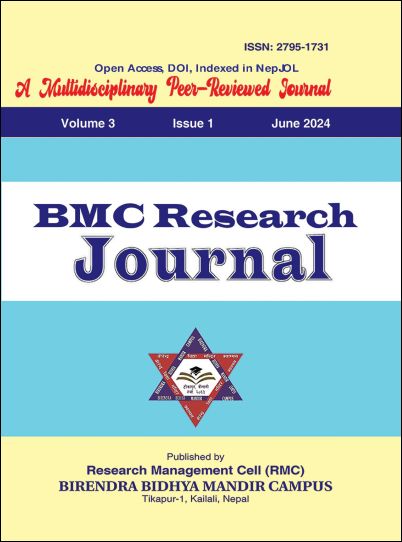Perspectives of ELT Teachers in Enhancing Writing Skills through Immediate Feedback
DOI:
https://doi.org/10.3126/bmcrj.v3i1.69272Keywords:
Correction code, immediate feedback, mistakes and errors, secondary level, writing skillAbstract
Immediate feedback is crucial for enhancing students’ writing skills as it provides timely guidance, allowing them to identify and rectify errors promptly, thereby fostering continuous improvement and proficiency in writing. This paper investigates the perspectives of secondary level English teachers on immediate feedback and the techniques they use while giving immediate feedback. The study was conducted on sixty English language teachers who have been teaching English at secondary level institutional schools of Nepalgunj Sub-metropolitan city of Banke district. The researcher used simple random sampling method to select the sample. The instrument used for data collection was a questionnaire. The obtained data were analyzed descriptively and interpreted using simple statistical tools. The majority of teachers (i.e. 86.66%) viewed that immediate feedback plays the role of scaffolding in their writing, while only a minority of teachers (i.e. 13.33%) viewed it negatively. The study revealed that almost all the teachers showed a positive reaction towards the role of immediate feedback to enhance writing proficiency. It was also found that most of the teachers used correction codes to correct student’s mistakes and errors. Thus, the English language teachers are recommended to use immediate feedback as a scaffolding tool to enhance writing students’ proficiency of secondary level students.
Downloads
Downloads
Published
How to Cite
Issue
Section
License
Copyright (c) 2024 The Author(s)

This work is licensed under a Creative Commons Attribution-NonCommercial 4.0 International License.
This license enables reusers to distribute, remix, adapt, and build upon the material in any medium or format for noncommercial purposes only, and only so long as attribution is given to the creator.




